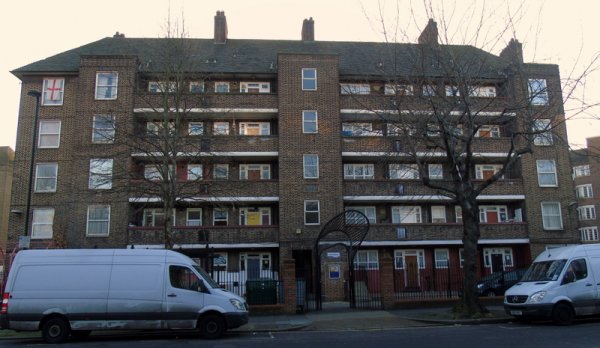Nov 27th 2020, 16:15
Blog 27th November 2020
In this blog I consider a government report that finds Britain is in a ‘systemic economic crisis’, the 2020 spending review, the cost of achieving carbon neutrality in Britain’s social housing stock that appears to be unaffordable, and our webinars.
The ‘Guardian’ has reported on a government report that concludes that Britain is facing a ‘systemic economic crisis’ because of the combined effect of coronavirus and Brexit and the likelihood of influenza, flooding, and social unrest over the winter.

The Cumberland Hospital at Carlisle
The paper finds that the effect on public services could be serious, especially in the cases of health and social care where the report states that:
“The pandemic has and will continue to limit the capacity of the health and care sector to prepare for and respond to the end of the (Brexit) transition period (with a) sustained level of system disruption from November until at least April”.
Adult social care provision is a particular concern with the civil service admitting it is ‘acutely aware’ of the risk posed by potential labour shortages caused by Brexit, because of reliance on European Union citizens and a workforce already stretched by pandemic controls. Apparently, the government had not expected Brexit to cause a major change in this area, but the report warns of the possibility of ‘provider failure’.
A reduction in imports of medicines is identified as a serious potential problem, with ‘a reasonable worst-case flow rate of 60-80% of current levels’, putting patient safety at risk.
The report found that local council finances are vulnerable, saying that:
“The level of sustained activity over 2020 at the local level has resulted in a lack of institutional capacity to absorb and implement the required changes for the end of the transition period”
5% of councils are at risk of financial failure in the wake of Covid-19, even after government support, and a no-deal Brexit could mean even higher demand on their services. The most vulnerable councils could need support from the military, or extra aid from the central government ‘especially if local responders find resources diverted to concurrent emergencies.’
Wednesday saw Rishi Sunak, the Chancellor of the Exchequer announce what he called the ‘2020 spending review’ but which could be more accurately described as the ‘2021/22 budget’. It did not provide good news for social housing with no new money being announced, nor for local authorities that will be obliged to raise Council Tax by 5%. Karen Sanderson, Director of Financial Management at the Chartered Institute of Public Finance & Accountancy described the situation as follows:
“While the statement was flush with cash in some areas, others were considerably lacking. A 4.5% increase in spending power for local authorities will be absorbed by increased social care costs off the back of the pandemic, and higher costs from the rise to the national minimum wage. This announcement also did nothing to address key structural issues, including reform to local government funding and social care. The Chancellor called this a review that ‘sets us on a path to deal with material matters of government’. Time will tell how this materialises for the communities and families most in need of support.”
News also broke on Wednesday that the external auditors had refused to approve the accounts of Hampshire County Council because they could not confirm that the Council was a ‘going concern’. If this is true it is very serious, and I would expect other auditors to follow suit at other councils.
The ‘Inside Housing’ magazine has carried out a survey of 207 housing associations and local authorities that has revealed that the cost of retrofitting all social housing in Britain to zero carbon standards will cost £104billion. This averages almost £21,000 a home.
The United Kingdom government has set a target for Britain to achieve net zero carbon emissions by 2050, while the Scottish government has set a target of 2045. Inside Housing’s survey revealed that 43 social landlords (21%) have set targets to achieve net zero within their housing stock before the target set by the national government. Most of these targets were set by councils and included 31 local authorities aiming to hit net zero within either their council area as a whole or their housing stock specifically by 2030.
Of the social landlords that responded to the survey, 46 could provide an estimate of how much it would cost on average to reach net zero with their housing stock, with answers ranging from less than £3,000 per home to £50,000 per home.
Optivo Housing Association quoted the lowest cost at £3,000 per home, but this was largely because the figure did not include planned investments such as roof and window replacements, as well as the sum for replacing gas heating with electric alternatives.
North West Leicestershire Council provided the highest total decarbonisation cost, stating it would cost ’up to £50,000 per unit’ for a comprehensive retrofit of its 4,200 properties and therefore it expected a total bill of £210million.
The Northern Ireland Housing Executive had the highest total decarbonisation cost, estimating it would cost £1.7billion to retrofit its 85,162 homes – an average of roughly £20,000 per home.
Neal Ackcral, Chief Property Officer at Hyde, told ‘Inside Housing’ that decarbonisation costs are only one of the additional costs that will be faced by social landlords as they are:
“Tied up with the substantial investment that will be needed to meet other upcoming key legislation, including the Fire Safety Bill, the draft Building Safety Bill and the Future Homes Standard”.
In its election manifesto, the Conservative party pledged a ten-year social housing decarbonisation programme worth £3.8billion, but details about when it will go ahead have since been unclear – so far, only a £50million pilot scheme has been produced. In any event, the £3.8billion of funding appears to be totally inadequate to fund a £104billion programme.

Flats on the Briant Estate in Lambeth
This raises the question of how local authorities and housing associations will be able to meet the cost of reaching zero carbon standards. Without additional funding there are three options:
In short, the government appears to be making promises that local authorities and housing associations will be unable to keep!
We will be holding other webinars from November 2020 to January 2021 including:
For further information or to make a booking, please click here.